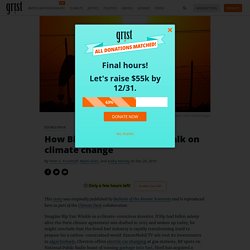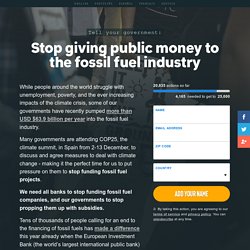Dec 2019
> #GLOBAL WARMING
> 2019
Planète Fragile : récif en danger Le 29 décembre 2019. SABOTAGE DE TROTINETTES CONTRE LA RÉFORME DES RETRAITES. Working toward a planet that doesn’t burn, a future that doesn’t suck. How Big Oil could walk the talk on climate change. This story was originally published by Bulletin of the Atomic Scientists and is reproduced here as part of the Climate Desk collaboration.

4 encouraging ways climate politics went mainstream in 2019. Over the course of the past 12 months, evidence of humanity’s blind hurtle toward climate catastrophe piled up: ice sheets crumbled, wildfires swept the world, and we learned one million species face extinction.

But that’s just half of the story.
Storing carbon and saving the economy? Mangroves can do both.
From Typhoon Hagibis in Japan to Cyclone Idai in Mozambique to Hurricane Dorian in the Bahamas, climate change–fueled tropical storms have been increasingly wreaking havoc on coastal regions across the globe.

These storms, especially in vulnerable communities, create significant economic losses. Although levees or seawalls have been thrown out as ideas for preventing those losses, such coastal defense infrastructure can be costly. It can also have detrimental impacts on nearby ecosystems. As climate change worsens, more and more experts are beginning to talk about nature-based solutions as a way to protect coastal regions from damage and mitigate economic losses. A new study released last week in the Proceedings of the National Academy of Sciences examines the role mangrove habitats in coastal areas in Central America play in mitigating economic losses from hurricanes. Mangroves offer other benefits, too.
Retraites : Meeting de J.-L Mélenchon contre la réforme de Macron.
Saint-Nazaire: Les Chantiers de l'Atlantique testent une voile innovante pour les... paquebots. Une voile géante sur un paquebot.

C’est bien l’objet du test mené par les Chantiers de l’Atlantique depuis le début du mois de décembre sur une maquette de 15m de haut, à quai, à Pornichet, près de Saint-Nazaire. L’idée est de tester pendant trois mois une voile de seconde génération en vue d’équiper des paquebots à propulsion vélique de type Silenseas. Son gréement comporte un mât capable de tourner à 360° pour s’adapter à la direction du vent.
Lyon : A cause du réchauffement climatique, la métropole est obligée d'abattre un millier d'arbres. Après l'échec de la COP25, l'engagement de Macron critiqué. Green Deal européen – le rôle du Budget européen. COP25 : En profond décalage avec l’urgence climatique. At COP25, indigenous groups are making sure their voices are heard. Global leaders and delegates from all manner of public and private organizations have spent the last two weeks gathered in the halls and chambers of the Feria de Madrid conference center for the United Nations Climate Change Conference, also known as COP25, discussing solutions for our overheating planet.

Amid negotiations, protests, and national leaders playing the blame game, some of the loudest voices have come from indigenous people demanding that any international climate policy include their expertise and interests. Last Friday, a large indigenous contingent led approximately 500,000 protesters on a march through Madrid’s city center in a monumental climate demonstration.
2019 Remixed ! (Year review by Cee-Roo)
NOS FORÊTS AGONISENT DANS L'INDIFFÉRENCE. Tell the EU: Side with people, not Big Polluters! - Corporate Accountability. The global climate treaty talks in Madrid should advance climate justice, not polluters’ profits.

But Big Polluters and their mouthpieces like the International Emissions Trading Association are pulling out all the stops to push forward market-based schemes that fail to reduce emissions—but let polluters keep polluting. And governments like the EU are siding with them.
Stop giving public money to the fossil fuel industry. While people around the world struggle with unemployment, poverty, and the ever increasing impacts of the climate crisis, some of our governments have recently pumped more than USD $63.9 billion per year into the fossil fuel industry.

Many governments are attending COP25, the climate summit, in Spain from 2-13 December, to discuss and agree measures to deal with climate change - making it the perfect time for us to put pressure on them to stop funding fossil fuel projects. We need all banks to stop funding fossil fuel companies, and our governments to stop propping them up with subsidies. Tens of thousands of people calling for an end to the financing of fossil fuels has made a difference this year already when the European Investment Bank (the world’s largest international public bank) cut its support for coal and oil financing.
#RDLS101 - Spéciale grève du 5 décembre - EN DIRECT !
‘Climate chaos’ is displacing the world’s poor communities. Climate-fueled disasters such as wildfires, cyclones, and floods were the No. 1 reason that people were forced to flee their homes in the last decade, according to Oxfam, an international confederation of 19 organizations that focus on global poverty.

Overall, these events have displaced more than 20 million people around the globe. The world’s poorest countries, which produce the fewest greenhouse gas emissions, overwhelmingly bore the brunt of the consequences of this extreme weather, said an Oxfam report released Monday. The alliance called for more “urgent and ambitious emissions reductions,” to address the climate refugee crisis. With the United Nations Climate Change Conference, or COP25, underway this week in Madrid, Oxfam urged the international community to take action on proposed solutions to this cause-and-effect imbalance, such as the creation of a fund to help affected countries cover disaster-related costs.
The researchers discovered that between 2008 and 2018:








